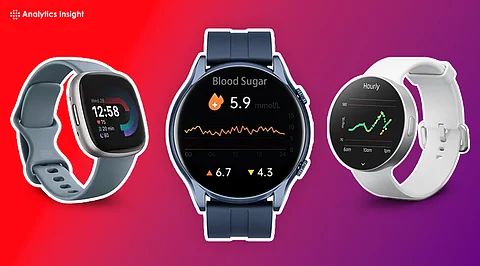

Smartwatches in 2025 now offer non-invasive blood sugar monitoring for better daily health tracking.
Top models like Galaxy Watch 7, Apple Watch Series X, and Fitbit Sense 3 combine fitness and glucose insights.
These devices help spot glucose trends, but they aren't replacements for clinical medical tools.
Health tech has really taken off lately! Now, we're seeing smartwatches that do much more than just track your steps. In 2025, some models can even keep tabs on your blood sugar, which is awesome for folks who need to monitor their glucose.
These watches give you data in real time, so you can make good choices about your health without having to poke your finger all the time or lug around big equipment.
Also Read: Building Smarter Health Systems: A New Era of Medicaid Innovation
Here's the lowdown on some of the best smartwatches with blood sugar tracking you should check out this year:
Samsung's Galaxy Watch 7 is among the first popular watches to offer non-invasive glucose tracking to lots of people. It uses cool sensors and light tech to guess your blood sugar levels through your skin. Plus, it has fitness stuff, sleep analysis, and stress tracking, making it a solid all-around health gadget.
Also Read: Cutting-Edge Wearable Tech for Fitness Enthusiasts in 2025
It's still sleek and light, so it's comfy to wear all day. The screen looks great and it's simple to use. The battery life is really good too. Plus, Samsung Health lets you track your progress, set reminders, and connect even more health data so you can see everything in one place.
The Apple Watch keeps improving, and the Series X shows that. It still has the stuff everyone likes, such as ECG and heart rate, but the 2025 one also tracks blood sugar without poking you, thanks to new sensors. Rather than just checking now and then, you get constant updates on where your glucose is going, which is great for seeing ups and downs early.
The Apple Watch Series X plays well with the Apple Health setup, giving you detailed reports and alerts. It's not cheap, but it's stylish, works great, and has lots of health features in one device.
Fitbit's Sense line has always been about health, and the Sense 3 adds blood sugar monitoring to the mix. It uses a special sensor and some smart math to estimate your blood glucose without needing any blood.
Besides glucose, it tracks your heart rate, sleep, skin temperature, and stress. The battery can go for up to six days, making it one of the longest-lasting options. Plus, with Fitbit Premium, you get insights, trends, and coaching based on the data it collects.
Garmin makes great fitness smartwatches, and the Venu 4 has even more cool health features. For example, it can now keep an eye on your glucose levels, which is really useful if you're an athlete or just like to stay active and want to manage your energy while you exercise.
Its AMOLED screen is bright and easy to read, even when you're outside. Garmin Connect makes it a snap to track all your wellness stats, including hydration, heart rate, and breathing rate, along with your glucose. With great battery life and GPS, it's a solid choice for fitness buffs who also want blood sugar tracking.
Amazfit has a rep for being affordable without skimping on features, and the Balance smartwatch is a perfect example. It's got a new system that uses infrared to monitor glucose and gives you trend analysis over time.
On top of health tracking, it includes fitness goals, breathing exercises, and sleep scores. Its simple design and range of useful features make it a contender if you want good value and usefulness.
Withings is cool because it mixes classic watch design with new health tech. The Horizon 2 looks like a fancy watch but has smart features like guessing your glucose levels, ECG, and checking your blood oxygen.
It's waterproof, the battery can last almost a month, and it syncs with the Withings Health Mate app. This combo of old and new is great for people who want health features without the typical geeky smartwatch look.
When picking a smartwatch for glucose monitoring, remember a few things. These aren't always as spot-on as medical equipment, so think of them as tools for spotting trends instead of making serious medical calls. Also, check the battery life, if it works with your phone, how comfy it is, and how good the health-tracking system is before you buy.
Smartwatches in 2025 have come a long way and are now powerful health tools, especially with blood sugar tracking. No watch can replace real medical devices just yet, but they give you good info and heads-ups. From high-end to budget-friendly, there's likely a model that fits your style and health needs.
